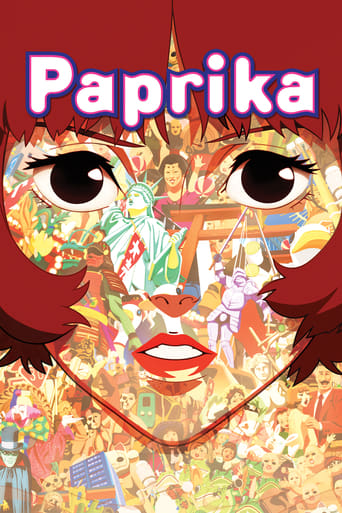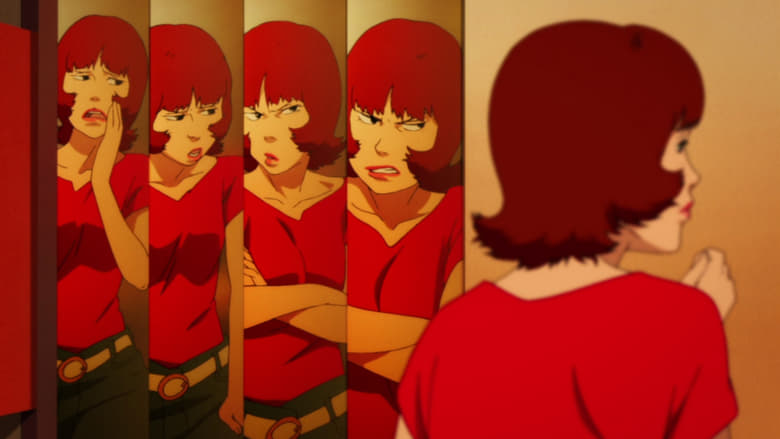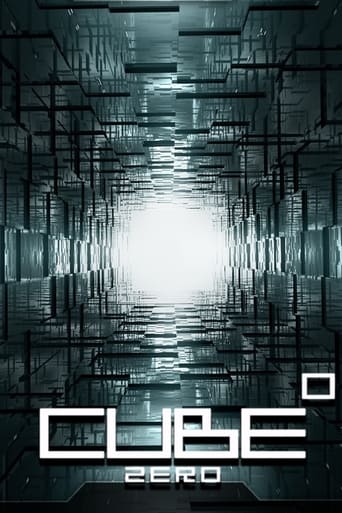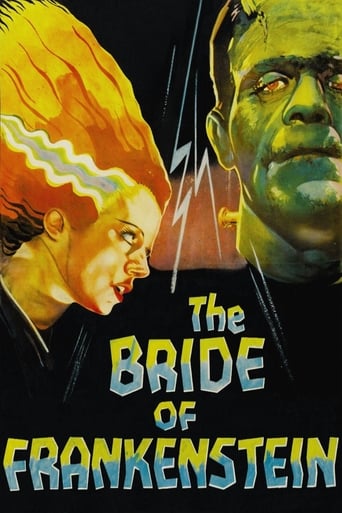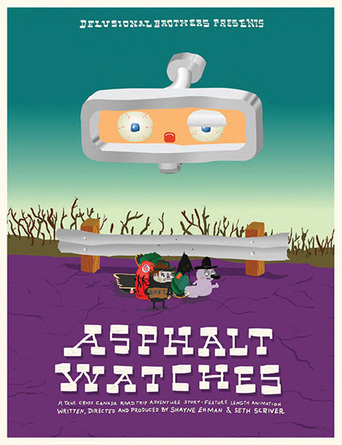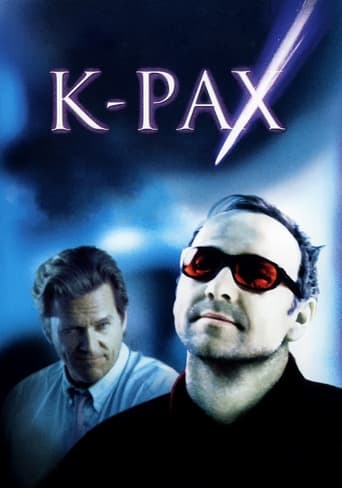Paprika (2007)

When a machine that allows therapists to enter their patient's dreams is stolen, all hell breaks loose. Only a young female therapist can stop it and recover it before damage is done: Paprika.
Watch Trailer
Cast



Similar titles
Reviews
The best way to describe this movie to someone is to ask them if they ever watched Alice in Wonderland.Satoshi Kon has always had a thing for duality as the core theme in this movies, whether it is Mima's private and public image in Perfect Blue, Chiyoko's heart-wrenching story both on screen and off-screen in Millennium Actress, or the salvation and destruction of family in Tokyo Godfathers. In Paprika, it is reality and dreams that play as the tools for this theme when a device allows the user and others to observe and even delve into their own and other's dreams.Paprika's beautiful animation accompanied with hypnotizing music made this a real treat to watch. I was pretty confused at first on what was going on, but knew enough to not get completely lost. This movie accurately portrays just how absurd dreams are and Paprika shows what happens when we allow our subconscious to run amok, causing chaos and confusion, sometimes in beautiful ways. Characters were very fun to watch and the story, whether absurd or grounded, is engaging to follow along.Overall, I enjoyed it and would recommend it to anyone interested in Kon's work or wants to try something a little out of the norm for anime.
What did I learn while watching this film? From now on I will always, always read some kind of summary of a film. For like most part of this movie I had no clue what was going on. And I still have no idea what Paprika really was. And I watched this film with my sister, and she too was super confused during this film. Usually not reading the summary doesn't affect me one way or the other, but this time I realised that there still are very confusing and complex movies that require some form of research before actually watching it.There's one thing I'm certain of Paprika: it's a very creepy movie. It's creepy in a weird way, and I can tell you that music playing when the weird dream parade marches on the streets will probably haunt me forever. And because the biggest theme of the film are dreams, many of those creepy, terrifying moments make absolutely no sense, like dreams usually don't. That what makes it resemble a nightmare and why you feel like you're going to have nightmares, even if you're not actually scared during the film. I mean nightmares are terrifying when you're sleeping, but once you are awake, they seem ridiculous. So that goes with Paprika. Naturally you are awake while watching the film, and it makes no sense like nightmares don't once you are awake, but it still creates that weird nightmare like feel to it.Even though this movie is mostly about dreams, I love how they were able to bring movies into it.But yeah, let's be honest, this movie is visually so beautiful! The characters are drawn very well, so are the backgrounds and all the weird dream things. Even when this movie gets so very freaky, it still looks amazing.Paprika is an interesting film and I wish I could write more about it, but unfortunately I think it would need a second watch - at least. Because during the first time I just felt like I was trying to get what was going on. But it's visually beautiful, the music is amazing and the plot and the dream theme are very complex and astonishing. Still, Paprika is definitely the weirdest film I've seen so far.
Doctor Atsuko Chiba uses her alter-ego Paprika to treat police detective Toshimi Konakawa and his unsolved case in his recurring dream. Chiba, man-child genius Doctor Kōsaku Tokita and Doctor Toratarō Shima are running a secret program to enter into other people's dreams using the DC Mini. When the DC MIni is stolen in an inside job, people's dreams start to get invaded. The wheelchair bound chairman Doctor Seijirō Inui puts up roadblocks on the investigation.The wild dreamworld is amazing. It is imaginative and creepy. The story is another dreamworld mystery. It does need to work on the real world aspects. It needs to distinguish the real world from the dream world in the first half of the movie. When the worlds start to blend, the audience needs to feel it. The movie as it is never seems to leave the dreamworld. The dreams loses cohesiveness but it never loses its wonder. This is a superb visually wild movie.
"I'm sick of following my dreams. I'm just going to ask them where they're going and then hook up with them later." - Mitch Hedberg Most of Satoshi Kon's animated films ("Perfect Blue", "Millennium Actress" etc) feature non-linear narratives which deftly merge pasts, presents, futures, dreams, fantasies and realities. His final feature, "Paprika", is no different.Though confusing at first glance, peel back its many layers and "Paprika" offers a fairly simple tale. Here we have a repressed psychologist who "enters the dreams" of patients in order to "fix them" and "make them more ordered". To do so, she creates a fantasy heroine called Paprika, a pixie-girl who embodies all the qualities the psychologist wishes she herself possessed. The irony of creating a fantasy to destroy the fantasies of others is lost on the psychologist.Next we have three emasculated men, one clinically obese, one wheelchair bound and one a police officer. The wheelchair bound figure seeks to symbolically "destroy all those who meddle with dreams". Why? Because dreams have become his chief means of achieving happiness, fulfilment and self-actualisation. Burnt by life, he depends heavily on, and retreats further into, his carefully groomed dreamscapes. Needless to say, Kon's "dreams" serve as metaphors for a wide range of "things". They represent everything from internet chat rooms to video games, movies, TV, drugs, sex, prostitutes, food and so on. His "dreams", then, are representative of any all human escapes or coping mechanisms.The cop, meanwhile, enters various dreams as a means of curbing his real life anxieties. Ingeniously, his meetings with Paprika occur in seedy locales, their psychoanalysis sessions resembling sexual liaisons with escorts or call girls. Other characters include a socially withdrawn computer programmer (symbolic of Japan's Hikkomori) and an assistant who acts out various rape fantasies. Virtually all the film's characters are psycho-socially messed up (nods to addictions, masturbation, alienation etc), Kon alluding to a Japan in which modern techno-capitalism has bred all manners of perversions and dysfunctions. The film's dream sequences, most of which feature a mysterious "marching band", are themselves packed with symbolic references to Japanese culture (lots of consumer objects, politicians, religious symbols etc). Elsewhere, billboards, advertisements and the glittery snake-oils of a hyper-consumerist culture bleed incessantly into and out of one another. Every commercial, jingle or pop-song is but another fantasy to be flirted with or discarded. By the film's ends, the dangers of fantasy (the social disconnection, violence, extreme egoism, sexism or misogyny they foster) are acknowledged, but also the emancipatory power of "dreams" as well, be they an individual or communal activity.Aesthetically, "Paprika" is strong, with mind-bending visuals and a memorable score. This being a Japanese animation, there's the obligatory tentacle-rape sequence, a bizarre fetish which goes all the way back to Hokusai's "The Dream of the Fisherman's Wife", and perhaps further. "Paprika's" climax is somewhat derivative, with its generic light-shows and gigantic apparitions, but it's nevertheless Satoshi Kon's strongest feature since "Perfect Blue". See "Existenz", "The Girl Who Leapt Through Time", "The Sky Crawlers", Sang-ho Yeon's "The King of Pigs" and "Demonlover".8/10 – Worth two viewings.

